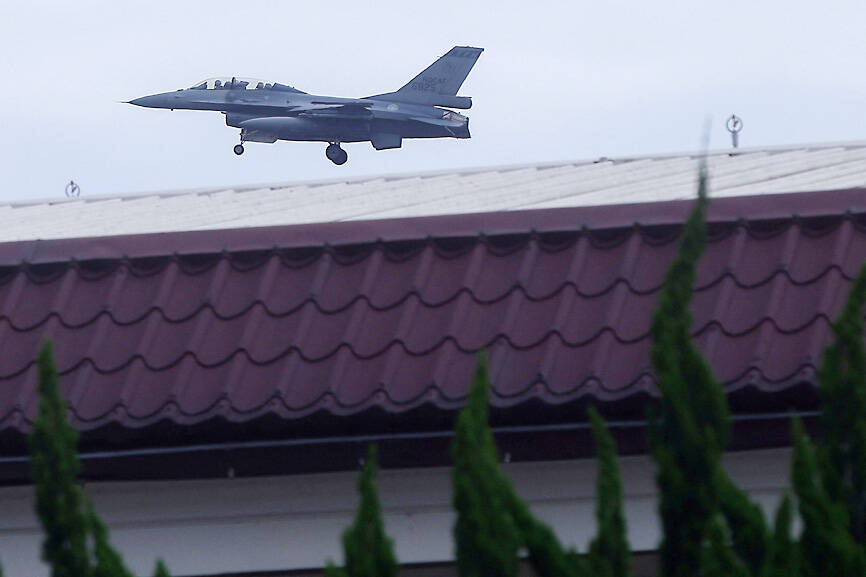A proposed US arms package comprising infrared search and track systems (IRSTs) for the nation’s fleet of F-16V aircraft would vastly improve their long-range detection and target tracking, significantly boosting air-to-air combat capabilities, the Ministry of National Defense said yesterday.
The proposed package comes at an opportune time, as daily incursions and flybys by Chinese warplanes and drones have become the norm, the ministry said in a statement released a day after a Pentagon agency notified the US Congress of the prospective arms deal.
Military experts expressed similar views, with one saying that IRSTs would allow fighter jets to track the infrared energy from enemy aircraft, without activating radar.

Photo: Ann Wang, Reuters
Not only do IRSTs improve flight safety, but when mounted on the 4.5-generation F-16Vs, they would boost the jets’ ability to detect Chinese J-20 fighter jets — a fifth-generation stealth aircraft — narrowing the performance gap between the two, said Chieh Chung (揭仲), an associate research fellow at Chinese Nationalist Party (KMT) think tank the National Policy Foundation.
Due to the J-20s specially designed fuselages that reduce radar reflections, when a radar system picks up the signal of a J-20 it is often closer than indicated, Chieh said.
With the help of the IRSTs, pilots would be able to determine earlier how close the enemy aircraft are, thereby gaining more response time, Chieh said.
The proposed sale of the IRSTs to Taiwan indicates that Washington has taken note of the challenges posed by China’s J-20s and wants to bolster Taiwan’s capabilities to respond to those challenges, he said.
IRSTs are pods mounted on aircraft that are capable of picking up the heat signatures of another aircraft, such as its engine exhaust, said Su Tzu-yun (蘇紫雲), an academic at the government-funded Institute for National Defense and Security Research.
The US military in 2020 launched an IRST upgrade program called the IRST-21, and the resultant product has been used on F-15 and F-16 jets to target stealth jets and small drones that have small radar footprints, Su said.
When Taiwan takes delivery of the IRSTs, it would be able to more effectively counter Chinese stealth fighter jets such as the J-20, Su said.
The advanced sensor systems would allow F-16V jets to hit enemy aircraft with AIM-20 missiles beyond visual range, he said.
Coupled with the F-16V’s superior dogfighting capabilities, that would give it an edge over stealth aircraft in close proximity, as the latter often have less maneuverability due to their shape — a trade-off that gives the stealth planes a smaller footprint, Su said.
The US’ decision to sell Taiwan the IRSTs also signifies deepening mutual trust, he said, adding that to date, the US had sold those systems or their equivalent only to its treaty-bound allies such as South Korea and Finland.

Chinese spouse and influencer Guan Guan’s (關關) residency permit has been revoked for repeatedly posting pro-China videos that threaten national security, the National Immigration Agency confirmed today. Guan Guan has said many controversial statements in her videos posted to Douyin (抖音), including “the red flag will soon be painted all over Taiwan” and “Taiwan is an inseparable part of China,” and expressing hope for expedited reunification. The agency last year received multiple reports alleging that Guan Guan had advocated for armed reunification. After verifying the reports, the agency last month issued a notice requiring her to appear and explain her actions. Guan

GIVE AND TAKE: Blood demand continues to rise each year, while fewer young donors are available due to the nation’s falling birthrate, a doctor said Blood donors can redeem points earned from donations to obtain limited edition Formosan black bear travel mugs, the Kaohsiung Blood Center said yesterday, as it announced a goal of stocking 20,000 units of blood prior to the Lunar New Year. The last month of the lunar year is National Blood Donation Month, when local centers seek to stockpile blood for use during the Lunar New Year holiday. The blood demand in southern Taiwan — including Tainan and Kaohsiung, as well as Chiayi, Pingtung, Penghu and Taitung counties — is about 2,000 units per day, the center said. The donation campaign aims to boost

The Kaohsiung Tourism Bureau audited six hotels in an effort to prevent price gouging ahead of Korean band BTS’ concert tour in the city scheduled for Nov. 19, 21 and 22 this year. The bureau on Friday said that the audits — conducted in response to allegations of unfair pricing posted on social media — found no wrongdoing. These establishments included the local branches of Chateau de Chine, Hotel Nikko, My Humble House, and Grand Hai Lai, it said, adding that the Consumer Protection Commission would have penalized price gougers had the accusations been substantiated. The bureau said the Tourism Development Act

BACK TO WINTER: A strong continental cold air mass would move south on Tuesday next week, bringing colder temperatures to northern and central Taiwan A tropical depression east of the Philippines could soon be upgraded to be the first tropical storm of this year, the Central Weather Administration (CWA) said yesterday, adding that the next cold air mass is forecast to arrive on Monday next week. CWA forecaster Cheng Jie-ren (鄭傑仁) said the first tropical depression of this year is over waters east of the Philippines, about 1,867km southeast of Oluanpi (鵝鑾鼻), and could strengthen into Tropical Storm Nokaen by early today. The system is moving slowly from northwest to north, and is expected to remain east of the Philippines with little chance of affecting Taiwan,